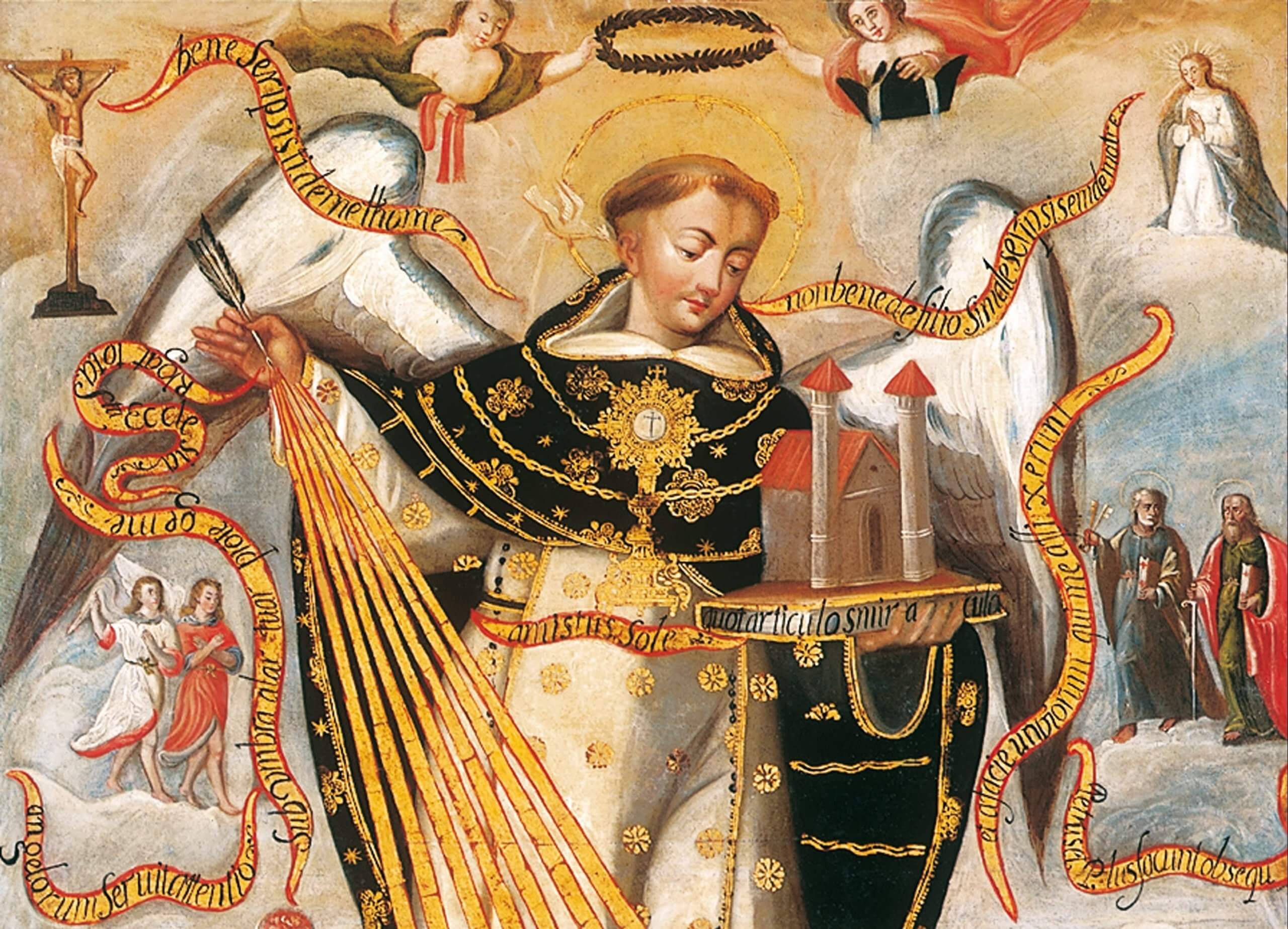Today marks the seventh centenary since that faithful steward of truth, who was Thomas Aquinas († 1274) – who since 1317 was called “Common Doctor of the Church,” “Angelic Doctor,” “Universal Doctor,” and “Doctor of the Eucharist” – was enrolled among the saints.
It took place on July 18, 1323, by Pope John XXII († 1334), who, after having preached around Psalm 85 and having sung the Veni Creator Spiritus and before singing the Te Deum, In medio ecclesiæ and Os iusti, canonized Saint Thomas in the Metropolitan Cathedral of Notre-Dame-des-Doms in Avignon.[1] Already speaking to the Cardinals in the Consistory, he had honored both the virtues and the doctrine of Thomas: “He alone enlightened the Church more than all other doctors; a man can derive more profit in a year from his books than from pondering all his life the teaching of others.”[2] Pius XI comments:
[These] words [of John XXII] echo those of Pope Alexander IV († 1261), who wrote to the living saint: “To Our beloved son, Thomas Aquinas, distinguished alike for nobility of blood and integrity of character, who has acquired by the grace of God the treasure of divine and human learning.[3]
One of the 512 questions and two of the 2669 articles of his masterpiece, the Summa Theologiæ, that monumental work left unfinished, also deal with music. In particular, in II-II, q. 91, a. 1-2, Aquinas asks himself two questions: whether God should be praised with the lips and whether God should be praised with song.
The first question reminds us of the somewhat simplistic arguments of the Italian journalist and writer Corrado Augias: “Praying for God to do or not do a certain thing implies that his will can be influenced is the same logic as one who invokes a miracle.” Furthermore, Augias goes on to say that “every god is, for the believer in him, very good and omnipotent. Why then want to bend his will according to our interests?”[4] To him, who defines himself as a believer “in a kind of universal harmony that unites us all,” and to those who think like him, St. Thomas replies:
We use words, in speaking to God, for one reason, and in speaking to man, for another reason. […] In speaking to God, not indeed to make known our thoughts to Him Who is the searcher of hearts, but that we may bring ourselves and our hearers to reverence Him. Consequently we need to praise God with our lips, not indeed for His sake, but for our own sake; since by praising Him our devotion is aroused towards Him […]. And forasmuch as man, by praising God, ascended in his affection to God, by so much is he withdrawn from things opposed to God (II-II, q. 91, a. 1).
In this sense, music has the possibility of exhorting, reawakening, and purifying, stimulating souls ad compunctionem, ad affectum Dei.
After this clarification regarding the benefit of vocal prayer and divine praise for the Christian, the Holy Doctor wonders about the usefulness of singing and the use of musical instruments during prayer:
As stated above [Article 1], the praise of the voice is necessary in order to arouse man’s devotion towards God. Wherefore whatever is useful in conducing to this result is becomingly adopted in the divine praises. Now it is evident that the human soul is moved in various ways according to various melodies of sound, as the Philosopher [Aristotle] state, and also Boethius. Hence the use of music in the divine praises is a salutary institution, that the souls of the fainthearted may be the more incited to devotion (II-II, q. 91, art. 2, ibidem).
And to the singers who fall into the temptation of protagonism, St. Thomas reminds that:
St. Jerome does not absolutely condemn singing, but reproves those who sing theatrically in church not in order to arouse devotion, but in order to show off, or to provoke pleasure (II-II, q. 91, art. 2, ad 2, ibidem).
What a valuable lesson comes from this “master of thought and model of the right way to do theology” to the many deluded people who, for over fifty years, have replaced him with Karl Rahner († 1984) and his “anthropological turn”![5] What strength can we, musicians, composers, singers of liturgical chapels, church organists and instrumentalists, from the words of the Doctor communis! We want to conclude by making our own the words pronounced by Pope Pius XI, during the audience with the members of the Pontifical Roman Academy of St. Thomas Aquinas on March 18, 1923, before the sixth centenary of the canonization of the Angelic Doctor:
We will celebrate this centenary making glory to God, thanking him for having given us in Thomas Aquinas such a large revelation of his infinite beauty, of the infinite splendors of that Wisdom which is Himself. We will build ourselves on the examples of that great man raised up by God and who never took his gaze off God, dedicating his whole life to the glory of the Church of God.[6]
[1] L. V. GERULAITIS, The Canonization of Saint Thomas Aquinas, Vivarium 5, 1967, p. 41.
[2] Quoted in PIUS XI, Studiorum Ducem, n. 10.
[3] Ibid.
[4] In La Repubblica, April 4, 2012; our translation.
[5] JOHN PAUL II, Fides et ratio, n. 43.
[6] In COLLEGIO URBANO DE PROPAGANDA FIDE, Alma mater, 5, Roma 1923, p. 130; our translation.


